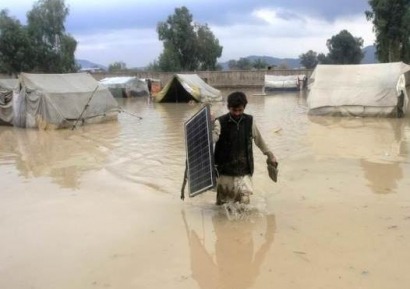
The international climate conference will be held in Le Bourget, a suburb of Paris, from 30 November to 11 December 2015.
In May, the government of Japan and the fund signed a contribution arrangement confirming the conversion of Japan’s pledge of $1.5 billion, which brought the fund over the 50 percent threshold required to start allocating its resources for projects and programmes in developing countries.
With the Japanese announcement, GCF formally reached ‘effectiveness’ and announced it would begin the critical phase of considering funding proposals with a view to submit to the Fund’s Board some initial projects later this year, ahead of the 21st Conference of the Parties (COP 21) to the UN Framework Convention on Climate Change (UNFCCC) in Paris.
This latest contribution brings the total of signed contribution agreements to $5.47 billion equivalent, or 58.5 percent of the amount that countries committed at GCF’s High‐level Pledging Conference in Berlin in November 2014.
Achieving the 50 percent threshold was a necessary requirement set by the Fund’s governing Board to declare the Fund effective.
“The Green Climate Fund commends the Government of Japan for the timely conversion of its pledge to a contribution arrangement with the Fund at such a crucial point in the negotiations ahead of COP 21,” said Héla Cheikhrouhou, GCF Executive Director.
“This achievement means the Fund has reached an important milestone and can now start making financial commitments to developing countries,” Cheikhrouhou said.
Atsuyuki Oike, ambassador director‐general for global issues in Japan’s Ministry of Foreign Affairs, said his country appreciated the finalization of the contribution arrangement, and that it occurred right before the 7th Pacific Islands Leaders Meeting which which was slated address financing for climate adaptation of small islands states.
“We now look forward to reviewing GCF’s first projects and programmes to achieve the Fund’s objectives, with a particular emphasis on vulnerable countries including SIDS and LDCs," Oike said.
"We also hope that the effective operationalization of GCF will contribute to successful negotiations for a Paris Agreement,” he added.
Between now and the Paris Climate Change Summit, the Fund aims to finalize its first set of projects for approval by the GCF Board, expected to take place at its eleventh meeting in November this year. An initial version of the Fund’s project proposal form has been published online for use by GCF national designated authorities (NDAs) and accredited entities that will channel GCF resources into projects and programmes. GCF’s declared effectiveness today sends a strong signal to global financial markets. The corporate sector would easily have the capacity and liquidity to fund additional investments into mitigation and adaptation projects in developing countries.
The Fund will likely be able to leverage some of its capital multifold with private‐sector cash, under measures aimed at reducing risks for investors, according to estimates made by Bank of America Corporation. To accelerate private sector investment in low‐emission, climate‐resilient activities, GCF’s Private Sector Facility will work hand in hand with international businesses, capital markets and the local private sector in developing countries.
In order to be paradigm‐shifting, the Fund is designed to provide concessional financing, to offer the full range of financial instruments to match project requirements, and to intervene at sub‐sovereign level. One of the Fund’s key innovations is its risk‐ bearing capacity, allowing it to bear more risk and thus leverage other less risky financing, notably from the private sector.
In its recent Impact Analysis, the Fund identified strategic priority areas and global investment opportunities which are not adequately supported by existing climate finance mechanisms, and that can be used to maximize GCF’s impact, in particular investments into efficient and resilient cities, land‐use management and resilience of small islands. Given the scale and urgency of financial needs for climate change action, the Fund continues to mobilize additional resources on an ongoing basis.
A strong financial base is important for GCF to be able to fulfill its mandate under the UNFCCC. The Fund calls upon countries, state‐owned entities and local governments that are able and willing to come forward and invest in the Fund.
“Governments that have not yet pledged to the Fund are encouraged to step forward,” Cheikhrouhou said.
“All other governments that have not yet signed their agreement with the Fund should do so urgently," she said.
To date, 33 governments, including 8 developing countries have pledged close to $10.2 billion to the Fund; 21 of them have signed a part or all of their contribution agreement since GCF’s Pledging Conference.
UNFCCC’s Conference of the Parties established the Green Climate Fund as the main operating entity under the financial mechanism of the Convention. The Fund is independently managed to enable a paradigm shift towards low‐emission and climate‐resilient development pathways in developing countries and help achieve the goal of keeping a global temperature rise under 2 degrees Celsius.
For additional information:

